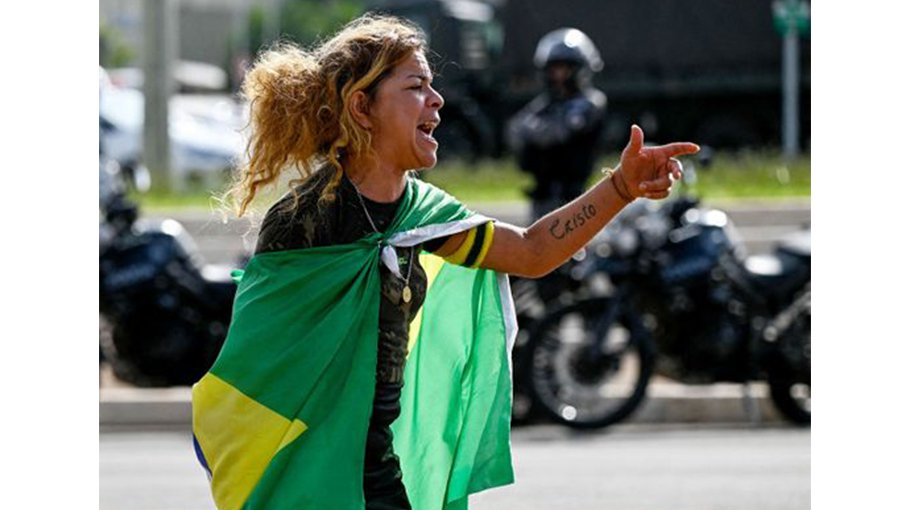Brazil’s success in protecting its democracy gives hope
Defeat of populist leader’s bid to cling to power shows strength of its institutions


Only a week after the inauguration of Luiz Inácio Lula da Silva as Brazil’s president, the supporters of former president Jair Bolsonaro stormed the country’s Parliament, Supreme Court, and Presidential Palace in Brasilia. Rioters overwhelmed the security in Three Powers Square, vandalised the buildings, seized arms from the president’s security office, and took away the country’s original 1988 constitution. These Bolsonaro supporters refused to accept the election result and had planned to provoke a military coup to bring Bolsonaro back to power.
There is no doubt that the democratic norms and institutions in Brazil are not as strong and deeply rooted as in the US. It was no surprise when Joe Biden took the oath of office on January 20, 2021. But not many had that sort of confidence about the resilience of Brazil’s nascent democracy and its institutions guaranteeing democratic transition of power.
The US has witnessed a peaceful transfer of power for over two centuries. But in Brazil, the tradition is barely three decades old. Civilian military control, as stipulated in the 1789 US Constitution, has been part of the bedrock of American democracy. But, in Brazil, the military has played a powerful role in the government since the country won its independence from Portugal in 1822. The military was the country’s most potent institution until the ‘New Republic’ declaration in 1985. Since then, Brazil has witnessed a slow transition to democracy, but Brazilians still hold the military in high regard. Brazil’s democratic transition has been primarily top-down, and the military guides the transition process.
Military under civilian control
Under Lula’s earlier stint as president from 2003 to 2010, and to some extent till 2016 under President Dilma Rousseff, the military gradually came under civilian control. However, after Bolsonaro became president in 2019, the military started regaining its importance in the corridors of power. Bolsonaro was a former army captain, and his vice-president was a retired general. He had also appointed several serving and reserved military officers to the key civilian posts in his government. In 2020, 6,157 military officers were in federal government jobs. Bolsonaro also kept the military happy by allocating the largest portion of his discretionary budget among ministries. Brazil’s annual military budget became larger than the next six Latin American countries combined. Undoubtedly, the military gained tremendous access to power under the Bolsonaro administration.
Thus, Bolsonaro and his supporters had a big hope that the military would back their claim of voter fraud as the reason for the narrow loss in the presidential election and would delegitimise the electoral victory of Lula. Bolsonaro had questioned the reliability of electronic voting machines many times before, and his defence minister also repeated that unfounded allegation before the votes were counted. So, there was a fear that the military might overstep its constitutional limits and potentially become tools in the anti-democratic plan of Bolsonaro to grab power.
However, Brazil’s generals decided not to align directly with Bolsonaro after the election and refused to support his conspiracy theories. In its report to Brazil’s electoral authorities, a few days after the election, the military indicated that it had found no evidence of election fraud. The military also affirmed its commitment to adhering to its constitutional role. Generals deciding not to side with Bolsonaro openly was also partly guided by the fact that they didn’t want to be seen as partners of Bolsonaro’s misrule.
Vital roles of judiciary and media
While the neutral role of the military was crucial to protect Brazil’s democracy from Bolsonaro and his supporters’ attempted coup, the independent judiciary and media also played their vital roles. Particularly Brazil’s judiciary, more forceful than even the American judiciary, has been very proactive to keep the country’s democracy on track. Brazil’s electoral court didn’t take long to ratify Lula’s victory in the election and swiftly rejected Bolsonaro’s legal complaint challenging it.
Immediately after the attempted coup, the Supreme Court removed Brasilia’s Governor for 90 days for failing to maintain security in the country’s capital. It also ordered several social media platforms to block messages supporting the coup. Police have already arrested nearly 1,500 people, including the former justice minister. The Supreme Court has already consented to the request of the prosecutor general’s office to investigate whether Bolsonaro, who is in the US now, incited the rioting mob that stormed the government buildings.
Brazil’s democracy received a severe assault from Bolsonaro’s right-wing supporters on January 8, 2023, and it survived as the US could on January 6, 2021. However, Brazil’s success in protecting its democracy in a comparatively rugged terrain is much more significant. The way key institutions of Brazil, particularly the military and judiciary, decided to side with the Constitution and not succumb to a populist leader’s plan to hold on to power after the election defeat gives hope for the struggling democracies in the developing world, those who are currently under the spell of Bolsonaro-type leaders. It also sends strong signals to those populist leaders that they may not stay in power forever just by subverting the country’s rules and institutions if they lose the electoral validation.
Ashok Swain is a professor of peace and conflict research at Uppsala University, Sweden. Source: Gulf News


